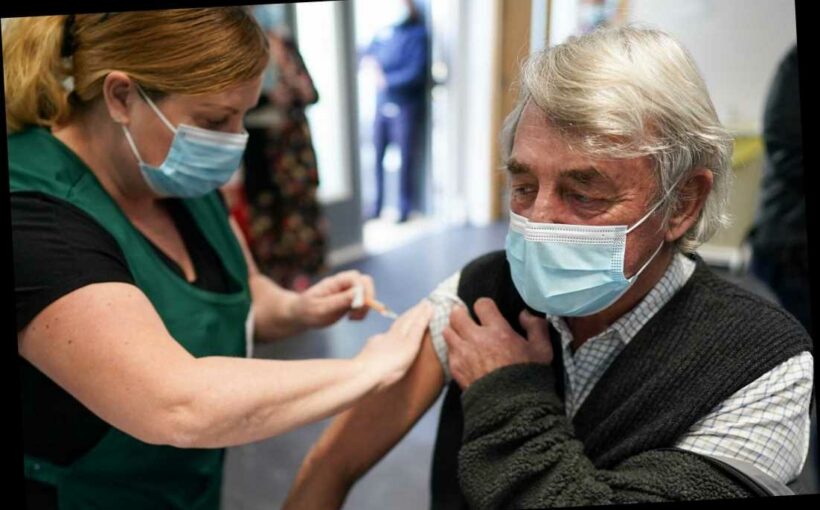VACCINATED people should be protected from severe disease caused by new strains of the coronavirus, a study has found.
Troubling variants identified in Brazil, South Africa, and California have mutations that have been shown to weaken the efficacy of vaccines.
🦠 Read our coronavirus live blog for the latest news & updates…
Some new variants are able to dodge antibodies produced by the immune system in response to a vaccine or prior infection.
But antibodies aren’t the only part of the immune response – T-cells are also important.
T-cells – including killer and helper T-cells – can remember bugs that have previously invaded the body, and are thought to play a large role in the length of protection against disease.
They are harder to study than antibodies, but are known to be a crucial part of the immune system.
A new study has shown that T-cells remain potent in those who have recovered from Covid, or had the Moderna or Pfizer jab.
Researchers at the La Jolla Institute for Immunology in California mixed blood samples from vaccinated or previously infected people with new variants in lab experiments.
They showed that T-cells from vaccinated people were still able to recognise the “spike protein” on the surface of the virus cell.
And T-cells in previously infected people were able to recognise multiple parts of the virus, including the spike and other proteins.
This was despite the fact the T-cells had been trained to recognise the characteristics of the first “original” strain of the coronavirus.
The study, which has not yet been peer-reviewed, found that new variants had a “marginal impact” on T-cells.
Dr Alessandro Sette, an immunologist at La Jolla and co-author of the paper, told Reuters: “These pieces are largely not changed/mutated in the variants.
“This means that the T-cell responses recognize the ‘ancestral’ sequence and the variants equally well.”
While the T-cells alone won’t be able to prevent someone from picking up the coronavirus, they are likely to prevent it from becoming severe Covid disease.
If a vaccinated or previously infected person is unfortunate enough to pick up the virus, they should only suffer mild symptoms.
The findings alleviate fears the Covid vaccines are under threat, as the researchers wrote: “The data provide some positive news in light of justified concern over the impact of Sars-Cov-2 variants of concern on efforts to control and eliminate the present pandemic.
“While it is not anticipated that circulating memory T-cells would be effective in preventing Sars-Cov-2 infection, it is plausible that they can reduce Covid-19 severity.”
However, scientists are still working on tweaked versions of the jabs in order to make sure they work in entirety against new strains.
The altered jabs will be rushed through regulations, the UK’s MHRA said today.
AstraZeneca, Pfizer and Moderna, the makers of the three vaccines the MHRA has approved for use in the UK, have all said they are aiming to modify their shots to cope with variants this year.
It comes just days after researchers announced concerning findings of the Brazilian variants’ ability to reinfect.
The variant, called P1, was found to be able to evade immunity created by between 25 and 61 per cent of previously infected people.
It’s a sign that current vaccines could also be less effective against P1 – which has similar mutations to the South African variant.
But Dr Nuno Faria, the lead author of the study from Imperial College London, told journalists: “We have no evidence so far that P.1 won’t respond to vaccines, at least for preventing serious disease.”
The researchers said the variant had only been studied in the Brazilian study of Manuas – where it first emerged – and it is not clear if the findings can be applied to all 25 countries where cases have been detected, including the UK.
Already it's been revealed antibodies in the blood of vaccinated people will be less potent against the South African variant.
Studies for the Pfizer and Moderna vaccines indicate a reduction in antibodies against the strain, up to six-fold lower.
Johnson & Johnson’s vaccine had 57 per cent efficacy in South Africa versus 72 per cent in the US, and Novavax’s vaccine had 49 per cent efficacy in South Africa versus 90 per cent in the UK.
When it comes to the Kent variant – which is dominant in the UK – evidence overwhelmingly suggests vaccines work against it.
Dr Jeffrey Barrett, director of the SARS-CoV-2 Genomics Initiative at the Wellcome Sanger Institute, said: “We have now seen a growing body of evidence from lab experiments that B.1.351 (South African) and P.1 (Brazilian) are less well neutralised by our immune response from vaccines or prior infection.”
He said it helped explain why those variants have spread so rapidly in the countries they emerged, as people are at risk of re-infection.
By contrast, experiments don’t show a large difference in the immune response to the Kent variant, meaning it has another edge that helps it to spread.
Dr Barrett said: “The ongoing success of vaccines in reducing infections in the UK (which are nearly all B.1.1.7 now) suggests that it is well neutralised by existing immunity.
“B.1.351 and P.1 don’t yet seem that they spread quickly in the UK given the restrictions that were needed to contain B.1.1.7.
“But because any reduction in vaccine efficacy is worrisome, our goal should be to keep them from getting a foothold here as restrictions are eased, so continued vigilance in our genomic surveillance is essential.”
Source: Read Full Article



